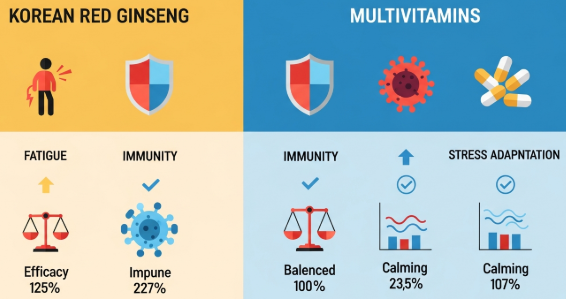Introduction
Fatigue, low immunity, and lack of energy are among the most common modern health complaints. Many people rely on multivitamins as a daily solution—but is that enough? Korean red ginseng has emerged as a scientifically supported adaptogenic herb that may outperform standard multivitamin formulas in certain areas, particularly energy metabolism, immune regulation, and stress resilience.
In this article, we compare Korean red ginseng vs multivitamins from a scientific and functional health perspective—so you can decide which one is better for long-term vitality.
What Multivitamins Actually Do
Multivitamins are designed to fill nutritional gaps, offering essential vitamins and minerals such as:
- Vitamin A, C, D, E, K
- B-complex
- Zinc, iron, selenium, magnesium, etc.
What multivitamins support:
✔ Basic immune function
✔ General metabolic processes
✔ Prevention of deficiencies
✔ Overall health maintenance
What they DO NOT do:
✘ Increase energy if nutrients are already sufficient
✘ Improve stress adaptation
✘ Enhance physical or cognitive performance
✘ Regulate hormones or inflammatory response
Most multivitamins are preventive, not therapeutic—and they do not directly boost stamina or immunity unless deficiency exists.
Korean Red Ginseng: A Bioactive Adaptogen
Unlike multivitamins, Korean red ginseng is not just a source of nutrients—it’s a pharmacologically active botanical rich in:
- Ginsenosides (Rb1, Rg1, Rg3, etc.)
- Polysaccharides
- Polyacetylenes
- Antioxidants
- Peptides
Scientific functions of ginseng include:
🧬 Modulating HPA-axis & cortisol
⚡ Enhancing mitochondrial energy metabolism
🛡 Upregulating immune cells (NK, T-cells, macrophages)
❤️ Supporting blood circulation & nitric oxide pathways
🧠 Enhancing cognitive function & neurotransmitter regulation
Energy Benefits: Ginseng vs Multivitamins
| Feature | Multivitamins | Korean Red Ginseng |
|---|---|---|
| Energy increase | Only if deficient | Yes—proven to increase ATP & endurance |
| Mental clarity | Mild | Stronger cognitive support |
| Fatigue reduction | Conditional | Proven anti-fatigue effects |
| Exercise performance | Minimal effect | Improves VO2 max & recovery |
Key Study
A 2013 placebo-controlled study found Korean red ginseng significantly improved fatigue resistance and oxidative stress markers in healthy individuals.
Immune System Effects
Multivitamins:
✔ Maintain immune cell function
✔ Prevent deficiency-related immunosuppression
Korean Red Ginseng:
✔ Increases NK cell activity
✔ Enhances antibody response
✔ Improves immune signaling and cytokine balance
✔ Acts as an antiviral and antimicrobial modulator
Clinical research from 2020 showed red ginseng users experienced fewer respiratory infections than placebo.
Stress & Adaptation
Multivitamins have NO adaptogenic benefits.
Korean red ginseng:
✔ Reduces cortisol
✔ Prevents stress-induced fatigue
✔ Enhances resilience to mental and physical stress
Which One Should You Take?
Take MULTIVITAMINS if:
- Your diet is poor or inconsistent
- You are at risk of deficiency
- Your doctor recommends it
Take KOREAN RED GINSENG if:
- You want more energy naturally
- You struggle with fatigue or burnout
- You want immune support beyond basic nutrition
- You’re looking for performance + adaptation benefits
Best option?
➡ Take both together —because they work through different mechanisms and do not conflict.
Conclusion
Multivitamins are like a nutritional insurance policy, while Korean red ginseng is a bioactive energizing and immune-strengthening supplement backed by clinical research. For those seeking improved stamina, concentration, resilience, and immunity—ginseng offers benefits that standard multivitamins cannot match.
Where to Buy Premium Korean Red Ginseng
🇰🇷 Sourced, processed, and stored properly for maximum ginsenoside content:
👉 https://seoulginseng.com







